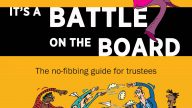Government and the Voluntary Sector, Policy, campaigns & research, Policy
Check out our response to the Annual Return consultation
Here's our response to the Charity Commission's consultation on the next version of the Annual Return.
We’ve responded to the Charity Commission’s consultation on the next version of the Annual Return and if you’re a trustee or in charge of running a charity, we’re urging you to do the same.
The Annual Return collects key information from charities above £10,000 annual income, and all Charitable Incorporated Organisations (CIOs). Charities with higher levels of income and certain types of activities also have to submit additional, more complex information. Together with other sources of data like charity reports and accounts, the Annual Return helps populate information on the public Register of Charities.
So, even if you’re a very small charity these changes could affect you, and the Charity Commission wants to hear your views – now’s your chance to tell them what you think. Without your input, you might find yourself burdened with too many questions that are too hard to answer the next time reporting season comes around! (Find out more about the consultation here)
To help you form your response, we’ve published ours. See a summary of our recommendations below or view our full response here.
Summary of recommendations
Throughout this consultation response, we include recommendations for further consideration by the Charity Commission as it moves forward with developing the Annual Return 2023. These are summarised below.
Flexibility of the Annual Return
In general, we support more flexibility with the caveat that the cost-benefit of additional questions should be justified, and new questions only added if there is a clear benefit and proportionate burden on preparers.
DSC Recommendations:
- Repeat the user testing exercise whenever questions are substantially added/deleted/changed, in addition to publishing details in advance of which
questions have been selected in that year and the rationale. - Include clear guidance about ‘what’s new for 2023’ to explain to preparers whenever substantial changes are made, to minimise confusion.
- Changes to questions about charity finances
These proposed changes are likely to substantially increase the regulatory burden and need
further consideration to be clear and proportionate.
DSC recommendations:
- Reconsider whether this section is about diversified income or connected parties, not both at the same time – and whether the topics questions should be split out.
- Recalibrate the proposed thresholds to reduce the regulatory impact whilst still gathering data from high-risk examples.
- Revise the income streams to include all types of income, including contracts and trading.
- Align the examples with the questions – for example by including local authority contracts as a ‘stream’ and examples in the guidance for ‘contracts’ and/or trading income.
Overseas income
These proposed changes already represent a substantial regulatory burden and are likely to increase it – they need further consideration to reduce the time taken to comply.
DSC Recommendations:
- Include a de minimis limit, for example of £10,000 for total overseas transactions, or a certain percentage of income (e.g. 10%), or £1000 per single transaction, for disclosing the source/location of the income.
- Consider revising the question on type of money transfer to confirm or deny whether any income was received by means the Commission might consider higher-risk, similar to the current AR question about ‘expenditure outside the regulated banking system’. For example, any income from ‘bank transfer’ would not trigger any response or follow up. But ‘did your charity receive any income in the form of cryptocurrency etc’ this would trigger a ‘Yes’ and then subsequent options.
Location of charity operations
Whilst having this data could be very useful, there are significant methodological and data integrity problems with designing related questions in a way that will gather robust data without being overly burdensome. Further, there may be safeguarding risks to publishing some data.
DSC Recommendation:
- At a minimum, the Charity Commission needs to clearly define what it means by ‘address to deliver services’, and ‘undertaking operations’ including guidance and caveats about how temporary or permanent those addresses must be to qualify, whether posting materials to a customer or beneficiary address counts, whether digital services are included etc.
- If it moves forward with this question, the Charity Commission should consider asking for a wider geographical category than address or postcode (e.g. county) to simplify responses for the preparer and protect vulnerable beneficiaries where the disclosure of precise locations could put them at risk.
Governance
In general, the proposals in this section make sense but the cost-benefit case for the website hosting question has not been satisfactorily made in our view. We’re also unclear why ‘political activity’ is an option in the list of organisational policies, as to our knowledge this is not a requirement or recommended in relevant guidance such as CC9.
DSC Recommendation:
- The Charity Commission should scrap the proposed question on website hosting andinstead target communications or alerts to trustees of types of charities and/or cause areas where it thinks an overseas web hosting might be a risk, or to publicise to trustees those countries where web hosting that could expose the charity to risk.
- Remove the ‘Political Activities Policy and Procedures’ from the list of options, or explain what this means and why it is being asked, with links to relevant guidance such as CC9.
View our full response here.


